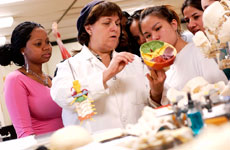- About Ramapo
- Academics
- Admissions & Aid
- Student Life
- Athletics
- Alumni
- Arts & Community
- Quick Links
- Apply
- Visit
- Give
Biology Convening Group
 Biology, the study of life processes, is a rich and complex discipline. At Ramapo College, Biology is studied from molecular, cellular, organismic, community, and evolutionary perspectives.
Biology, the study of life processes, is a rich and complex discipline. At Ramapo College, Biology is studied from molecular, cellular, organismic, community, and evolutionary perspectives.
The Biology major is organized to give our students a firm foundation for understanding the central principles of the study of life processes, yet it permits student flexibility to select courses which reflect their own particular areas of interest. In the core biology courses, students examine principles of change and continuity, inheritance and evolution, unity and diversity of organisms and their interaction with the environment and the impact of the environment on all life forms.
Ramapo’s well equipped modern laboratories include an environmentally-controlled greenhouse, computer rooms, computerized biology and physiology labs, all of which allow students to explore the many aspects of biology both within the context of courses and as participants in faculty research.
Graduating Biology majors:
- Will have a wide ranging knowledge of biology and the ability to apply that knowledge in a problem-solving environment.
- Students will appreciate that:
- organisms are related to each other in time and space
- organisms share processes by which information is coded and transmitted
- organisms live in complex and fragile interacting ecosystems
- Will be proficient in basic laboratory skills common to biology and chemistry, such as microscopy, spectrophotometry, gel electrophoresis cell culture and volumetric and gravimetric methodologies.
- Will have the ability to communicate scientific information clearly and precisely, both orally and in written form.
- Will have had the opportunity to conduct research projects, either as part of an upper level course or as a participant in an active individual laboratory research projects within the College or as part of an appropriate cooperative education assignment outside the College.
- Will have an understanding of the principles of experimental design and data analysis and be able to formulate and carry out strategies for solving scientific problems.
- Will have the opportunity to take field courses which provide a direct exposure to natural biological systems.
Biology majors are prepared for graduate school, professional schools of medicine, dentistry, veterinary medicine, and other health-related professions. Graduates are also prepared to work in industry, education, and government settings such as the U.S. Fish and Wildlife Service, U.S. Environmental Protection Agency, U.S. Department of Agriculture, Food and Drug Administration, and New Jersey Department of Environmental Protection as examples. The Teacher Education Program in Biological Science prepares students for New Jersey State Certification to teach Biology at the secondary level.
The Major is offered by the School of Theoretical and Applied Science and leads to a B.S. degree.
Note: students must have at least a “C” average in SBIO 110 and SBIO 112 to take 300-level Biology courses.
Copyright ©2025 Ramapo College Of New Jersey. Statements And Policies. Contact Webmaster.

Follow Ramapo